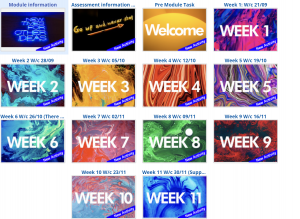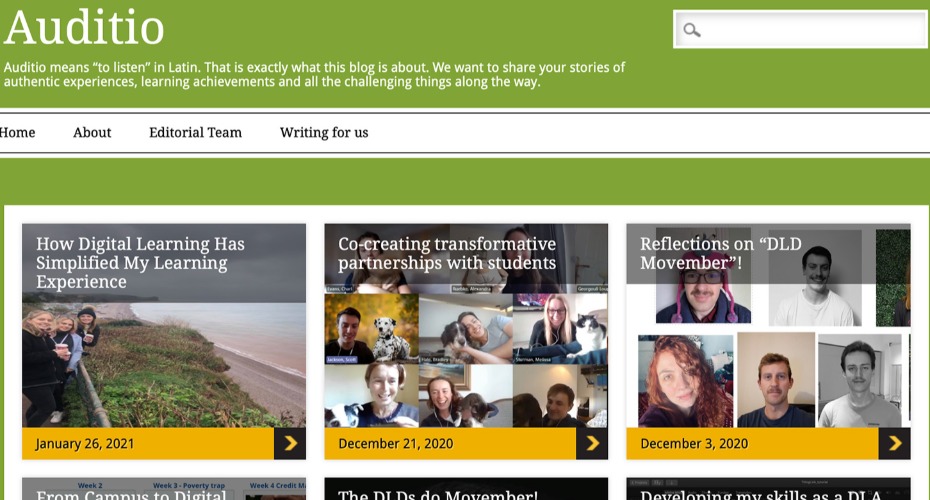
The unexpected upsides of digital learning – and overcoming the downsides
The unexpected upsides of digital learning – and overcoming the downsides
For many students, the accelerated move to digital learning in 2020/21 has posed a number of challenges. But it’s also had its advantages.
Here, Millie Britton, a final year Economics with Geography student and Digital Learning Assistant, reflects on a year of digital learning.
From my own experiences as a third year, and the experiences of other students, the digital learning environment has brought both benefits and challenges.
After writing a recent blog post about my digital learning journey I have spoken with multiple Digital Learning Developers (DLDs) who have been working with their respective departments, and with Digital Learning Assistants (DLAs) to collect the views of students so far this year.
The unexpected upsides
Structure of module pages

A clearly laid out ELE module page
I’ve never really questioned the layout of module pages on the Exeter Learning Environment (ELE). I’m not even sure I made use of them much. After speaking with several Business School DLDs, who have been talking with students and DLAs, it’s evident (for some modules) that the pandemic has encouraged a more attractive and inclusive use of ELE pages. Examples of good practice include ‘book structures’ and ‘tile designs’ of modules and these are being adopted across departments. It seems that clear and coherent module pages is something that a lot of us didn’t realise we needed. They’re simple but extremely effective. Clear design allows content to be separated and broken down, so as students we are not so overwhelmed. A clear and consistent weekly structure is both visually appealing and far easier for students to manage their workloads.
Shorter video recordings
Much of the wider student community feedback from the Business School DLAs and DLDs praised the use of shorter video clips instead of 50-minute-long lectures. I expected to be greeted each week with long lectures that just replaced the two weekly lectures, per module, that I had before. But other Business School students and I have been pleasantly surprised to find shorter lecture clips that align with our, sometimes, shorter attention spans. Concise pre-recorded material can be found throughout Business School modules.
Variety of online resources
This leads me on nicely to my next unexpected upside of the new digital learning environment: the variety of online resources. I don’t think I can stress enough – and I’m speaking on behalf of the Business School DLAs and DLDs and several Geography students – that the extensive use of online resources is impressive! I’d never even heard of some online resources, such as R-Shiny and Mural. Mural encourages discussions across breakout rooms because all groups are visible in one Mural. You can find out more in this Exeter INDEX blog post which was shared by Mural itself on Twitter.
Love this look at Engaging Students in Real Time Collaborative Learning ? ? from @markthompson1 with @lisaharris & @Annabel_Ilic of @UofEBusiness in @exeterindex ? https://t.co/PklEyMcZyN
— MURAL (@MURAL) February 25, 2021
Even if technical issues occur in Teams or Zoom, students can still complete the tasks using Mural. It seems that, as the year has progressed, more lecturers have adopted a variety of online resources to make content engaging and individual. I’ve spoken with many students who have enjoyed the introduction of Padlet and Piazza this year as anonymous platforms for questions and discussions. Students would definitely appreciate keeping such forums when in-person teaching safely returns. I’ve recently written another blogpost for Auditio about engaging students in the online environment which mentions the variety of online resources.
Online peer study groups
The formation of peer study groups, as reported by Economics and Accounting and Finance DLDs, has been particularly effective throughout modules. I vouch for this too. Last term I engaged in my first ever ‘study group’, which was useful to spread the workload of reading material in preparation for assessments. I do think it’s harder to create collaboration opportunities within the digital environment, and there have been concerns about this. But having experienced my first ever online study group I would definitely recommend putting the suggestion out there in online sessions. It’s the great thing about the chat function in Teams or Zoom: you can just send a quick message and you’ll usually get a message back, because everyone is eager to make new connections. See this recent blog post on Auditio by DLD Josh Oldridge about a virtual platform used in the College of Engineering, Maths and Physical Sciences.
Overcoming the downsides
High screen time
As I’m in the first year of students trying out this new digital learning environment, there have undoubtably been some downsides. As the University plans the 2021-22 content, I’m hoping it seeks to overcome the problems we’ve faced. It’s scary to think about the high screen time that both students and lecturers are facing. I always think back to when I was younger, and was told that my eyes would go square if I stared at my screen for too long. As a final year student during the pandemic, I think it’s safe to say that my eyes must definitely be square.
In all seriousness, many students are worried about the amount of time spent working on their laptop or tablet and sometimes I am thankful that some of my module work – such as my weekly problem sets – can be printed off to complete. I guess I’m just lucky that my course allows for this. It’s clear from speaking with other students that this isn’t the case with many ‘essay-based’ subjects, and this extended screen time is taking a toll on students.
I’m no expert, but I want to say it’s important to give yourself a break from your screen. Many students I’ve spoken to have found it relieving to take a daily walk, usually to the Quay, and if you’re feeling really motivated, a home workout helps. I’m hoping the transition back to a blend of in-person and online teaching can overcome this inevitable downside of online learning, as it will take the pressure off using your laptop for absolutely everything.
Motivation
I feel that as students we are all finding it difficult to stay motivated. When speaking with friends and DLDs in the Accounting and Finance department, it’s apparent that the overwhelming workload (especially that of third year), mixed with the significant changes to how we learn and are expected to learn, is taking its toll. Some days I struggle to get work done and have to try and give myself days off. I find that hard given the amount of work I have to do. But I think the important message is that it’s OK to have a day off and that – to an extent – is the beauty of online learning.
For more information please contact:
If you’re a University of Exeter student and have been struggling with motivation too, check out the resources on Study Zone Digital on Time Management and Motivation (internal link).
If you have queries about this article please email GlobalEnhance@exeter.ac.uk
Related Links

Millie Britton


